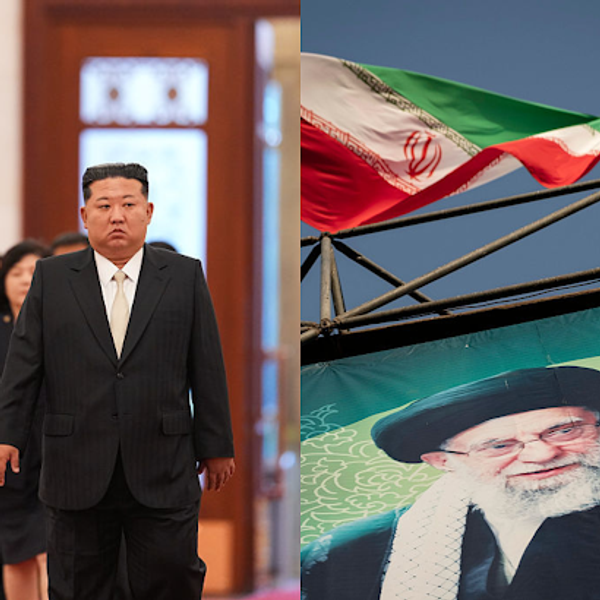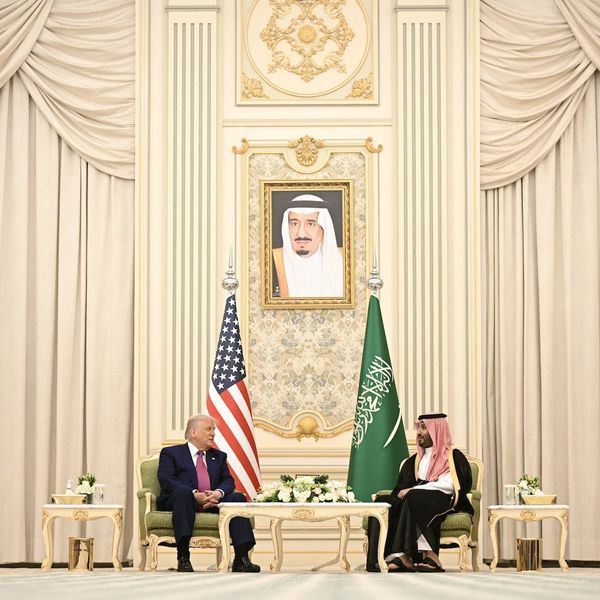OPINION - “They [the Houthis] don’t have to do much to win. It’s a very low bar. They just have to continue attacking, however small. It doesn’t have to be so grandiose or great. A barrage on occasion is a victory for them…The U.S. can appear impotent in the world. They cannot stop this group [the Houthis]…not a nation state. In fact, it is a relatively small group in Yemen that doesn’t even control the key population centers.”
That was retired Vice Admiral Kevin Donegan, speaking on a recent panel at the Arab Gulf States Institute in Washington about the Houthi challenge to maritime security in the Red Sea and the Gulf of Aden. Donegan, a former commander of the Fifth Fleet and Director of Operations, Central Command (CENTCOM), has led multi-national anti-piracy operations at sea in the Middle East.
Since November, Houthi forces in Yemen have been attacking ships passing through the Red Sea with missiles and armed drones, and occasionally they have seized commercial vessels. The Houthis have claimed they were responding to Israel’s war on Hamas in Gaza, and despite a series of retaliatory strikes by a U.S.-led coalition, the Houthis say they will continue their attacks unless Israel ends its invasion of the Gaza Strip. As of early March, the Houthis had carried out more than 60 such strikes, disrupting international trade that uses the Suez Canal on the shortest shipping route between Europe and Asia.
The Rubymar, a Belize-flagged, United Kingdom-owned cargo ship, was hit by Houthi missiles February 18 and sank March 2. It was carrying more than 41,000 tons of fertilizer to Bulgaria and had leaked oil for several days after it came under attack. On March 6, a Houthi missile strike killed three crew members and wounded four more aboard the Barbados-flagged cargo ship True Confidence in the Gulf of Aden. True Confidence was carrying Chinese carrying steel products and trucks and was en route to Jeddah, Saudi Arabia, and Aqaba, Jordan. These were the first fatalities linked to the Houthis attacks which began last November.
Who are the Houthis?
Houthis are Zaydi Shiites, a minority group among Shia Muslims who established themselves in north Yemen’s rugged mountains in the eighth century. For the next thousand-plus years the Zaydi Shiites have fought for control of Yemen with various degrees of success. The U.S. invasion of Iraq in 2003 deeply radicalized the Houthi movement against Americans; the Houthis adopted a slogan, “Death to America, Death to Israel, Curse upon the Jews, Victory to Islam.”
Their current leader, 44-year-old Abdul-Malik Al-Houthi, has served as the group’s military commander since 2004. In 2010, he became the group’s spiritual and political leader upon the death of his father, Badre al-Din al-Houthi. The Houthis now boast tens of thousands of fighters and an arsenal of armed drones and ballistic missiles, much of which has come from Iran. According to a February 6, 2024, Defense Intelligence Agency release, the group has also received training from Iran’s Islamic Revolutionary Guard Corps.
While the Houthis major attacks have been publicized, CENTCOM officials say the group’s strikes have come on almost daily basis.
For example, last Tuesday, between 2:00 a.m. and 4:30 a.m. local time, Houthis fired a close-range ballistic missile from Houthi-controlled areas of Yemen toward the Arleigh Burke-class guided-missile destroyer USS Laboon in the Red Sea. The missile did not impact the vessel and there were no injuries or damage reported.
On Wednesday, Houthis fired an anti-ship ballistic missile from Yemen into the Gulf of Aden; again, the missile did not impact any vessels. On Thursday, Houthis fired two anti-ship ballistic missiles toward the Gulf of Aden and two additional such missiles towards the Red Sea – again, with no injuries or damage reported. They fired three more anti-ship ballistic missiles on Friday, and two unmanned aerial (UAV) vehicles on Saturday, all toward the Red Sea. U.S. forces successfully engaged and destroyed one UAV and the other is presumed to have crashed into the Red Sea.
In other words, a dozen attacks carried out in less than a week that generated no headlines – but which could have been disastrous had they struck their targets.
Subscriber+Members have a higher level of access to Cipher Brief Expert Perspectives and get exclusive access to The Dead Drop, the best national security gossip publication, if we do say so ourselves. Find out what you’re missing. Upgrade your access to Subscriber+ now.
Looking for answers
What’s the Houthis’ goal? How have the U.S. and its allies responded, and how can the attacks be stopped?
The Gulf States Institute panel tried to answer those questions. Maysaa Shuja al-Deen, Senior Researcher at the Sana’a Center for Strategic Studies, an independent think tank in Yemen’s capital, described the Houthis as “a fighting group since day one,” who are “sympathetic to Palestinians” and see the current situation as “a good opportunity to prove themselves as a regional actor.”
Another panelist, Gregory D. Johnsen, saw the group’s Red Sea activities as helping the Houthis bolster their support inside Yemen, where they had been facing recent criticism.
Johnsen, the author of a book on Yemen, a former member of the Yemen Panel of Experts for the United Nations Security Council and currently Associate Director, Institute for Future Conflict at the U.S. Air Force Academy, said that “by basically baiting the United States into a military conflict, the Houthis are able to mute some of that domestic political criticism by tying themselves to the Palestinians…and there’s a rally-round-the-flag effect. Whereas they’re under bombardment from the U.S. and the U.K., so they say, look, ‘We’re the defenders of Yemen, we’re under attack from outside,’ and people rally to their cause.”
As for the future, Vice Adm. Donegan said, “We have to keep defending ships the best that we can, but we can’t count on that. And then we have to really make the pain level ratchet up for the Houthis - for the finances that they have, future finances, future relationships with Iran, future relationships in the region, wherever we can apply that pressure, because the Houthis want a longer term, they’re looking long, not short, and they want to be relevant.”
“What we’re doing isn’t working,” Adm. Donegan added. “We have to show to Iran that they have to stop the supply chain, and we have to interdict the supply chain.”
The U.S. has retaliated against Houthi targets and taken some steps against Iran itself.
On January 28, a U.S. Coast Guard cutter operating in the Arabian Sea intercepted a shipment of weapons from Iran on its way to Houthi-controlled parts of Yemen. According to CENTCOM, the “boarding team discovered over 200 packages that contained medium-range ballistic missile components, explosives, unmanned underwater/surface vehicle components, military-grade communication and network equipment, anti-tank guided missile launcher assemblies and other military components.”
In early February, the United States conducted a cyberattack against the Iranian ship MV Behshad, which was widely believed to be aiding the Houthis by providing targeting intelligence on vessels in the Red Sea and the Gulf of Aden. Following the cyberattack, the MV Behshad retreated toward Djibouti and for a few days, there was a drop in Houthi attacks in the Red Sea, but the ship has since returned to the Gulf of Aden.
A U.S. official who spoke to Voice of America on the condition of anonymity said the cyberattack on the MV Behshad was part of a multipronged response to the January 28 drone strike by an Iran-backed militia group that killed three U.S. soldiers in Jordan. A source with knowledge of the cyberattack said an Iranian frigate was also targeted.
The American and British strikes against Houthi targets in Yemen have hit dozens of targets, including an initial strike in January that hit 60 targets in 28 military locations with more than 150 munitions. Other such attacks have followed, though officials say they have balanced their response given the U.S. concern for civilian casualties in Yemen.
It’s not just for the President anymore. Cipher Brief Subscriber+Members have access to their own Open Source Daily Brief, keeping you up to date on global events impacting national security. It pays to be a Subscriber+Member.
As the panel neared its conclusion, Adm. Donegan made a series of points:
“It can’t be the U.S. alone…For years we’ve been talking about Arab defense by Arabs…The Arabs have to be part of the solution, whatever it is…specifically, the UAE and Saudis.”
In addition, he said, “We have to show Iran they have to stop the supply chain stuff. We have to interdict the supply chain piece…We have to make the pain level ratchet up for the Houthis, whether that be through the finances that they have, future finances, future relations with Iran and [we have to] keep relationships in the region.”
As for the Houthis, he said, “What’s being done now just emboldens them, because it makes the [Houthis] cause – ‘Hey we are standing up to these great powers.’”
Tricky as it is, Adm. Donegan said, “I believe the U.S. should be leading this,” and in that I do agree. That is what great powers do – try to solve tricky, local, multi-national problems before they become even larger regional or even worldwide ones.
Read more expert-driven national security insights, perspective and analysis in The Cipher Brief












